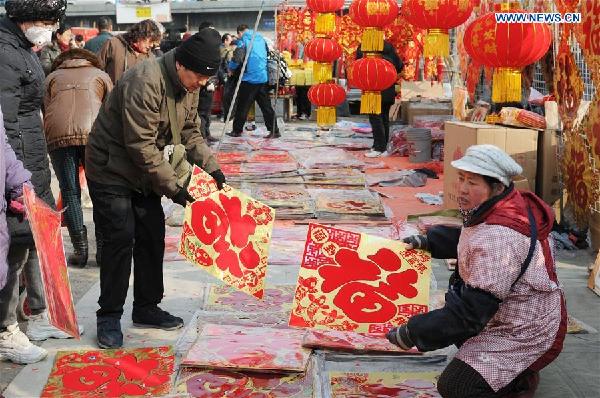It is vital to learn from past humiliation as well as glory
- By Wan Lixin
 0 Comment(s)
0 Comment(s) Print
Print E-mail Shanghai Daily, January 13, 2016
E-mail Shanghai Daily, January 13, 2016
|
|
|
People select goods for the upcoming Chinese Lunar New Year at a fair in Qingdao City of east China's Shandong Province, Jan. 11, 2016. (Xinhua/Wang Haibin) |
The beginning of a new year always brings with it a chance to anticipate, to start anew, to compose a fresh list of resolutions.
A colleague recently shared with me some observations by Brazilian writer Paulo Coelho that he found moving: "Everyone is finishing chapters, turning over new leaves, getting on with life, and they [your friends and family] will all feel bad seeing you at a standstill. Things pass, and the best we can do is to let them really go away."
Well said.
But the passing year should also provide us food for rumination and reflection.
We Chinese are a backward looking people who deem history as essential shaper of the present and future.
If anything, the high seriousness with which we view our history sets us apart not only from the Europeans, but probably also from many of our neighbors, for instance the Indians. During the Tang Dynasty (618-907) the monk Xuan Zang made a journey to India, and the book he later wrote about the journey in his Datang Xiyu Ji, or "A Record of a Journey to the West in the Time of the Great Tang Dynasty," which became a vital source for historians to reconstruct history of ancient India.
The late Chinese leader Mao Zedong is said to have read Sima Guang's Zizhi Tongjian ("The Comprehensive Mirror for Aids in Administration") 17 times. I don't know how many history professors have committed as much energy in attacking this 3-million-character tome.
To the uninitiated it is little more than a year-by-year chronology of major events spanning 1362 years (403 BC-959).
A forward-looking approach to life gives us a chance to leave our troubles behind and be inspired by new possibilities. But an occasional backward glance can bring us back to earth — and perhaps show us that 2015 wasn't much different from 2014.
Mao was one of the greatest shakers and movers in modern time.
In February 1972, when Nixon said to Mao in Beijing that Mao's writings "moved a nation and have changed the world," Mao replied that "I haven't been able to change it. I've only been able to change a few places in the vicinity of Peking." In hindsight we should probably be thankful for this lack of change.







Go to Forum >>0 Comment(s)